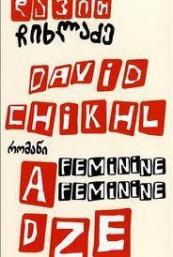FEMININE/FEMININE
‘Take note of the vocabulary: his texts are crowded with words: life, friendship, love, infatuation, freedom, death, flower, light, fire, etc. Or this is a tight-rope crossing. How many books we know that are full of the word ‘pain’, which, even if we read them from beginning to end, never once make us feel any ‘pain’? I am convinced that there are lots. Because writing with key words is the shortest path to falling into banality. David Chikhladze also falls into banality, but of his own volition, sentimentally, ritually… he falls into a banality which is pure, poetic, eye-opening and vertiginous: and how could he not do so? ‘Banality is, after all, his favourite word.’
Shota Iatashvili, poet, critic
‘I think that the reason I liked David Chikhladze’s novel Feminine/Feminine is that the stories described are so close to me, so well-known and painful for me ,as a person who has lived through the Soviet Union and its perestroika, who personally knows David Chikhladze and can call myself his friend… and now, when I try to talk about this novel, I would like to have Karlo Kacharava by my side: in 1993 he read fragments of Feminine/Feminine and mentioned Roland Barthes, who wrote about Philippe Sollers’s book H as follows: ‘Why, for what reason, in fear of what should I refuse friendly feelings when reading the book of Philippe Sollers that I feel towards him? H should be read not with your face stuck in the book, as for the contemplation and consumption of a finished product, refusing any personality, but to support him who wrote this book, as if we were writing this book at the same time as the author himself.’
Bella Chekurishvili, poet, critic
Extract will be available soon
In case of using the information, please, indicate the source.
